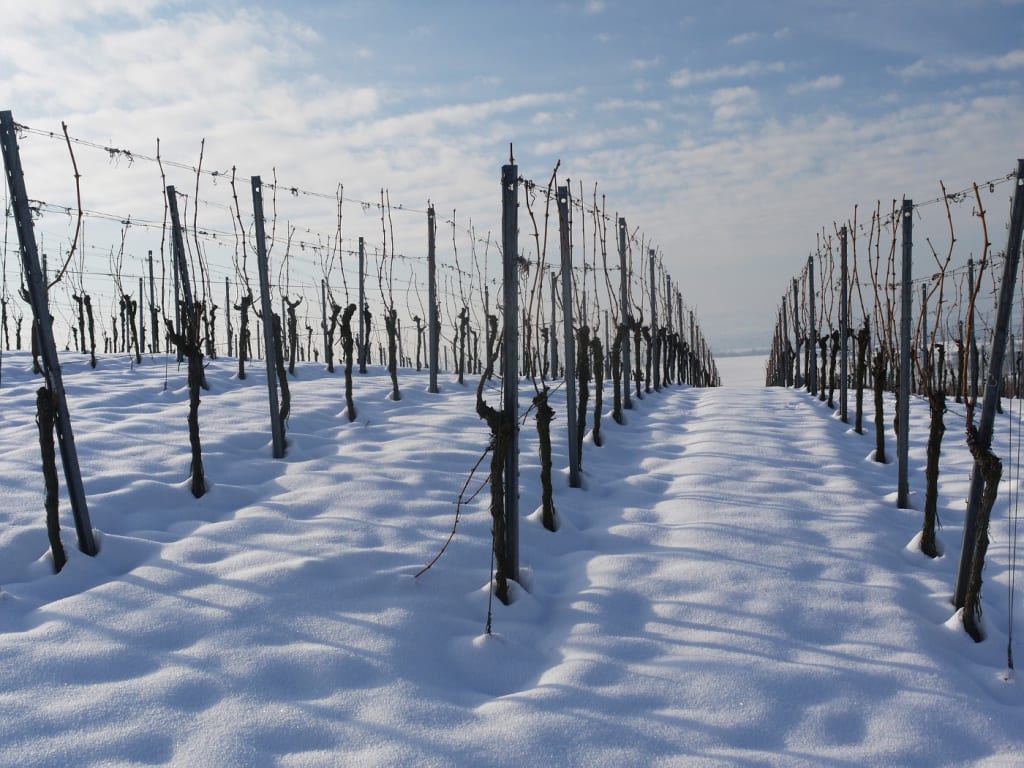
The snow fell heavy around Christmas time last year and remained ass deep for months. Phil pruned his vines all winter with Jack, the hired man, strapping snowshoes to their feet. The snowshoes allowed them to walk on top of the drifts; but their feet, not insulated by the snow, froze every day by noon. The vines were half buried in snow and they had to bend over all day to reach them. By noon, Phil’s back stiffened up, also. He and Jack made their way to the house each day at lunchtime to thaw out and straighten up. Phil told his wife, Carol, he’d rather lie on the hard kitchen floor than eat.
“I’ll just set a place for your man, then,” she said.
“Not in the kitchen, he’ll be fine eating in the basement next to the furnace.” Phil believed it wasn’t good to get too familiar with the hired help. “I pay him good money to trim my vines. I don’t have to be friends with him, too.”
The truth of the matter was that Phil believed it wasn’t good to get familiar with anyone. He and Carol were of different sorts, as different as the French Hybrids that Phil grew next to the Concords. Twice a year they hired extra help for tying and picking; Carol would call up all her girlfriends and she would join them swarming over Phil’s vines, chattering all day. He would skip lunch then, too. Carol would lead the droves of help to the house and Phil would fuss with the trellis during tying season or haul the bins of fruit out with his tractor during picking. Phil was never far from his vines and Carol was never far from her friends.
“I don’t understand it,” she said, “you’re out in the grapes all day long, you won’t let Jack talk to you when you’re out there, I would think you’d like a little conversation when you come in for lunch. I know Jack likes to talk when he’s out there. But you won’t even talk to him to pass the time while you’re working.”
Phil didn’t try to explain that a grape trimmer couldn’t be carrying on two conversations at once. The grapeman has to be in conversation with his vines. In the summer the leaves tell whoever is listening their concerns about fungus and insects. In the winter he interviews the vines one by one. They tell him, if he will listen, about their health and aspirations for the year. When the trimmer steps up to a vine he notes the bark of the stump, the canes left from last trimming, where the shoots came out, and how far they grew. He misses nothing of what they say to him and his shears answer them back with a judicious balance of restraint and enthusiasm. Grapes, he knew, grew best when kept out of each other’s shade. They also grow best when they are kept a little desperate.
“If you’re not going to eat your lunch,” Carol said, “and if you’re not going to let Jack up here with us, then I hope you let me bring your lunch down to him. It’s going to waste otherwise.”
Phil let her go. She was right; the lunch would go to waste. Lying on the hard floor, Phil could hear very well the conversation going on beneath him between Jack and his wife. Jack had left his lunch in his car, he told her, and it froze during the morning. He was trying to thaw out an egg salad sandwich on the furnace duct, but Phil kept his house so cold it would still be frozen by the time Phil was done resting his spine and wanting to get back to work. So, thank you, he appreciates the gesture, he would have some lunch.
Each day, thereafter, Carol made lunch that would go to waste if she didn’t take it down to the hired man. Their conversation came up through the floor to Phil. They started out as brief, polite exchanges that, in time, gave way to laughter.
Little marked the passing of the winter except Phil and Jack’s progress through the vineyard, and Carol and Jack’s progress through their acquaintance. The days followed one another like snowshoe prints up and down the vineyard rows. The most recent stood out clear and crisp in the snow, as the wind erased the older ones. On some days, the wind rattled the canes on the wires and stung their cheeks until they grew enough beard to cover them. On other days the wind was still and all they could hear was the snipping of the shears. The winter finally broke on the day that Phil could hear no conversation at all coming up through the floor after Carol took Jack’s lunch down to him.
As silent as lunch was that day, the vineyard was full of noise. About four feet of snow was melting fast and the water was rushing down the gullies into the lake. It had warmed so much that, on the days that followed, the two workers could have eaten outdoors, but Phil’s spine still demanded the hard kitchen floor. His vertebrae, in that silent house, snapped back into place as loudly as the traps Phil had set up in the house to catch the mice that were stirring from the spring thaw. Phil returned to work after resting briefly while Jack lingered in the basement with Carol.
Then one rainy Friday, Jack didn’t return at all. When Phil got to the house that night, Carol also was gone. She hadn’t even brought in the wash before she left. The line had broken with the weight of a soaked bed sheet. Phil slept that night on the kitchen floor listening to the rainfall. The rain would certainly wipe out what was left of the snow by morning and, by morning, he would conclude what to do without his wife.
At the first light, Phil sharpened his shears and walked back out to work. Without Jack he would have to hustle to finish the trimming by the time the buds popped. Just as he thought, the snow was mostly gone except where the drifts piled up. Rain still fell. Rivulets ran to the edge of the brim of Phil’s hat and gathered, swelling into a drop. The drop inhaled moisture and grew like a long sob until, too heavy to hang on, it broke free of the brim and plummeted in front of his face.
The world was having a long soak. Raindrops clung to the trellis wires like Christmas lights someone forgot to take down. The shaggy bark of the vines sopped up the rain like a sponge and darkened. Pulled by gravity, the moisture ran down the trunk to a band, bare of bark, that mice, protected from the cold by the deep snow, had chewed away. The raindrops skidded down the wound that gleamed white like an exposed bone. Phil regarded his ruin.
He broke into a run through his grapes to examine the damage now revealed by the melting snow. All over the vineyard, the mice had girdled most of the vines, snacking on the cambium layer that bears the nutrients up and down the trunk between the bark and the sapwood. If the vine was partly girdled, it may be stunted. If it was girdled all the way around, it was certainly dead. As he had prepared his vines for spring, invisible disaster had nibbled below his feet.







Comments
There are no comments for this story
Be the first to respond and start the conversation.